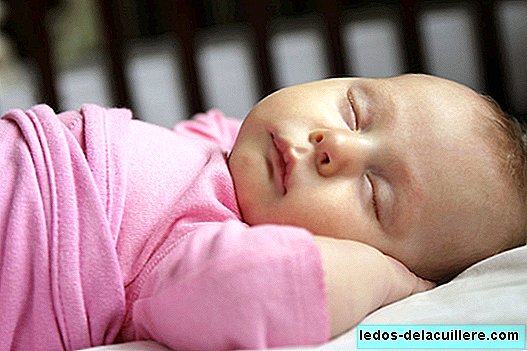
Almost a month ago we explained that Leon Eisenberg, the psychiatrist who put more emphasis on getting ADHD to be considered a real disorder, said before he died that it was an example of a fictional disease. Already in that post I told you that I was not who to affirm or deny the existence of ADHD and now, after all the comments and after talking with many people about it, I still think the same: I think the disorder exists, I think there are children who they suffer but is totally overdiagnosed.
An example of this is their perception of the disorder in France. If in the United States it is considered that practically 10% of children suffer from ADHD, in France the number of children diagnosed corresponds to 0.5%. Why this difference? Why in France there are hardly any children with ADHD?
Biological disorder vs psychosocial disorder
The first reason is the perception of the disease. In United States psychiatrists consider ADHD to be a biological disorder, that children are born with him and that, in addition to being treated with therapy, he must, or usually, also be treated with methylphenidate (Ritalin, Concerta).
In France, on the other hand, psychiatrists believe that ADHD is a disorder that has psychosocial and situational causes, of the child's environment. Instead of using medication to modify the treatment, they focus solely on the child's social context, using psychotherapy or family therapy.
In conceiving the disorder in this way, there are many children whose behavioral problems or attitudes are not enough to receive the diagnosis of ADHD, children who are likely to improve with such therapies. Only a minority, only those whose cases are more serious, 0.5% commented, end up being really diagnosed with ADHD.
In France the DSM is not used
In the United States, psychiatrists use the DSM (Diagnostic and Statistical Manual of Mental Disorders) as a reference guide when diagnosing problems and disorders such as ADHD. In France, on the other hand, they make use of the so-called CFTMEA (Classification Française des Troubles Mentaux de L'Enfant et de L'Adolescent), created by the French Federation of Psychiatry, first launched in 1983 and which you can access, in its 2012 edition, through this link.
I know I light the fuse again, but it is inevitable, a study by the American psychologist Lisa Cosgrove, who wanted to know how far psychiatrists who develop the DSM could have hidden interests, revealed that, of the 170 members of the group DSM work, 95 (56%) had one or more financial relationships with companies in the Pharmaceutical Industry. It is unacceptable and intolerable that someone who writes a manual to diagnose and treat people later obtains a benefit with such treatments for a very simple reason: the credibility of what is written in the Manual is questioned (which is a fine way of saying no. It is ethical).
Thanks to the CFTMEA, French psychiatrists have a guide to classify unusual behaviors on those who work. As they find solutions, as they impact on the child's social context, on the environment, on the same child and his family and as the relationships between him and others are resolved, finding strategies so that the child can focus on things and can lead a more or less normal life, the number of children who end up being diagnosed with ADHD decreases (as much as in France there are 20 times fewer children diagnosed than in the United States). In other words: the number of children who are diagnosed with ADHD in the US would be much lower if they worked like in France.
The food and the lifestyle

In France, in addition, they give much importance to food in this regard, and they are clear that some dyes and preservatives could be behind many behavioral disorders that could be diagnosed as ADHD.
In United States this is not taken into account and in addition to many children diagnosed with ADHD they have childhood obesity rates that scare and even with children of 8 years taking pills before destined for the elderly, to lower cholesterol.
A very different parenting style
It is said that in France parents have a different parenting style than Americans. In France, it seems, parents are more intense when explaining the rules to children and are less permissive. In this way children have a clear family hierarchy, understand the rules and are better able to have appropriate behaviors.
In the United States, many children end up being the ones they send at home, the parents in tow, and when this happens, many of them end up crying out for someone to take charge of the situation, sometimes with behavioral disturbances in search of a reaction from of parents who put things in their place (and I do not talk about punishments or hard hands, but simply to act as father and mother, taking care of responsibilities).
They are what we have already said not so much, the so-called disguised claims, when a child misbehaves to ask for attention in that way, when he is saying so that something has to change in family dynamics, when he feels overwhelmed because he has to make too many decisions for his age, when his parents don't play parents or when they don't spend enough time with them and solve the regrets with material things, empty of feelings.
In summary
In summary, there are many things that in France are taken into account that in the United States could simply be overlooked as a matter of concept. Some do not believe that ADHD comes from brain dysfunction and others believe so. The former are then forced to seek solutions to all possible factors causing behavior problems and the latter have more freedom to end up prescribing a medicine that solves the chemical imbalances of the brain They think those children suffer.
What psychiatrists are right? The big question is this, knowing in which country they are right, or which of them are closer to the truth. I personally I lean more towards the vision of the French. I do not say that you can not be born with an ADHD, nor do I deny that there may be problems with the receptors of the brain or the aforementioned chemical imbalances ... time and science will respond one day to this, but what I don't conceive is that one in ten children can be born with a behavioral disorder. It is impossible, it is unreal and it is an insult to the intelligence and common sense of people.
In fact, it is so absurd, that because of the overdiagnosis they are carrying out, medicating children that all they do is be children (and making people ironically say that of "but if what this child does I did as a child ... let's see if they should have medicated me too "), are getting you to doubt the existence of ADHD and that, children who really suffer and their families, suffer even more if possible due to the lack of understanding of the rest, who are suspicious of the veracity of the diagnosis.












